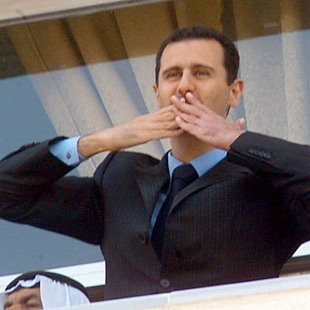Bashar’s Fall Will Give Israel the Golden Key

 Iranians are warily eying the situation unfold in Syria; a country which has been their strategic regional ally for more than three decades. The fall of Bashar Assad will have strong implications for the Islamic Republic, perhaps undermining its regional influence. Hassan Hanizadeh believes that the pro-democracy movement has been hijacked by external elements and domestic opposition which will reconcile over Syria’s territorial claims.
Iranians are warily eying the situation unfold in Syria; a country which has been their strategic regional ally for more than three decades. The fall of Bashar Assad will have strong implications for the Islamic Republic, perhaps undermining its regional influence. Hassan Hanizadeh believes that the pro-democracy movement has been hijacked by external elements and domestic opposition which will reconcile over Syria’s territorial claims.IRD: What is your assessment of the ongoing crisis in Syria?
HH: I think we need to differentiate between the popular uprising in Syria and those that took place in other Arab countries, such as Tunisia and Egypt. The Syrian pro-democracy movement started as a popular, legitimate protest, at first aimed at structural reform, individual freedom and lifting the 40-year state of emergency. But from a certain point, this movement was hijacked by foreign elements. What we are observing now is a powerful front including the United States, former Syrian Vice President Abdul Halim Khaddam, Saudi Arabia, Lebanon’s 14th of March alliance, Jordan, and the Syrian Muslim Brotherhood. They are determined to topple the Alawite-dominated Assad family regime in any way possible. The Muslim Brotherhood and Abdul Halim Khaddam have recently sent delegations to the United States and Israel, trying to assure them that in the event they come to power: 1) they will cede the strategic Golan Heights to Israel and give up all claims to this 1967-occupied strategic region, 2) they will diminish the Resistance [Hezbollah] in Lebanon, and 3) they will terminate the Tehran-Damascus-Beirut axis. A similar delegation representing Khaddam, the Brotherhood and Saudi Arabia visited Ankara to meet the Turkish PM Recep Tayyip Erdogan. Reportedly, it has promised to release claims to the disputed Iskanderun region in southern Turkey, which is claimed by Syria, in return for Ankara’s support.
The anti-Bashar team that has taken the helm now is not seeking reform, rather, the overthrow of the regime and the purging of Alawites from the state. Their rise to power equates with Syria experiencing a sectarian strife, similar to Lebanon of the 1970s and 80s that turned the country into debris. The Muslim Brotherhood is fervently anti-Alawite and anti-Shi’a.
IRD: Knowing how the international community is eying Syria’s chaos, how long do you think Bashar Assad can stay in power?
HH: This depends on Bashar Assad’s mettle and his political wit. He is a lonely man now, and has a tough job weathering the storm and at least persuading the US and the European Union to cease pressures and lift the recently set sanctions. Bashar’s survival can also have significant implications for the Tehran-Damascus-Beirut axis. Inside the ruling elite we are also witnessing a rift, as they are tempted and bribed by the Saudis, Khaddam, and Hariri.
IRD: Why has Russia opposed UN Security Council sanctions on Syria?
HH: I think Russia’s concerns are primarily financial. Russia is Syria’s main arms provider while Damascus owes a heavy debt to Russia since the age of Cold War, and this discourages Moscow from playing a serious role in Syria’s developments, as it did in Libya too.
IRD: How should Iran respond to the popular protests in Syria?
HH: Our politicians should closely monitor the situation. If Bashar’s regime falls, the Middle East’s golden key will go to Israel. The Resistance movement in Lebanon and Palestine will be seriously jeopardized and Israel will infiltrate one step closer to the inside of the Middle East, where it can cooperate with the Persian Gulf Cooperation Council. We must beware of GCC and Israel’s plots.
* Hassan Hanizadeh is a Middle East affairs’ analyst.

